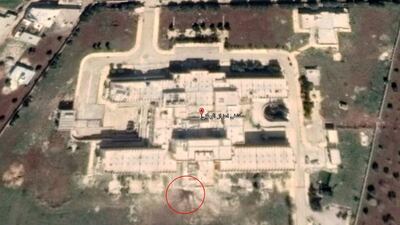Russia’s Ministry of Defence released a video on Thursday that confirms it bombed a hospital near Aleppo, one of the first concrete admissions from Russia that it targeted civilian infrastructure during the war in Syria.
The disclosure from Russia was most likely unintentional, because the country consistently denied attacks against civilians.
The video was released to settle a political dispute with Armenia, which claimed Russian-made weapons were ineffective during the battle against Azerbaijan.
In the video, Russian Iskander missiles are seen hitting a variety of targets, one of which is the Azaz National Hospital, north of Aleppo.
Twitter user @obretix was quick to geo-locate the strikes visible in the footage using satellite imagery.
He found that while Russia was attempting to showcase the might of its arsenal, it revealed it was behind the bombing of a Syrian hospital.
The strike most likely occurred in early February 2016, during the height of the battle to control Azaz.
An activist and a doctor told Human Rights Watch that the Azaz National Hospital was one of two hospitals bombed in February 2016, leaving only one operational hospital in the town.
A strike on February 15 against the Women and Children's Hospital in Azaz killed 14 people.
The Azaz National Hospital seen in the video was outside the city centre and near the frontlines of the battle at that time. It was evacuated 10 days before the strike, the activist said.
A 2016 report from Human Rights Watch said that on February 12, the Kurdish People's Protection Units, backed by Russian air strikes, captured the Minnigh airbase, south of Azaz, from opposition forces. Turkey reportedly began shelling YPG positions around Azaz from its border on February 13.
After reports that hospitals in Azaz were targets in attacks, Russia was quick to deflect blame and point the finger at Turkey.
But Thursday’s video shows Russia bombed at least one of the hospitals.
Angered by complaints from Armenia’s Prime Minister Nikol Pashinyan about Russian-made weapons used during the recent conflict with Azerbaijan, Russia used social media to show off the success of their weaponry in Syria.
Mr Pashinyan claimed only 10 per cent of Russian-supplied Iskander missiles used by Armenian forces in the conflict exploded on impact.
This claim was the spark for what Mr Pashinyan described as a coup attempt in Armenia on Thursday.
Mr Pashinyan sacked the deputy chief of the general staff, Lt Gen Tiran Khachatryan, who disagreed with his claims about the Russian weapons.
His dismissal ignited an uprising in the Armenian Army, which demanded that Mr Pashinyan resign.
In Russia's bid to disprove Mr Pashinyan's claim, the Defence Ministry released the video showing the success it had with the missiles in Syria.
“The Russian Defence Ministry said the experience of using them in Syria showed that these missiles are the best in class,” state media reported.
But the video reveals more than just the force of the Iskander missile. Bombing hospitals, which are considered protected spaces, is a war crime under the Geneva Conventions.


